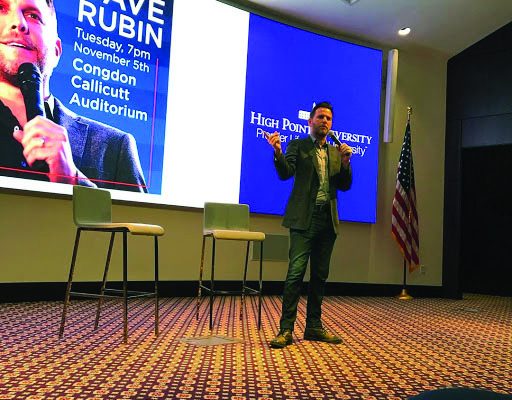College Democrats and Libertarians welcome David Rubin

The Rubin Report’s David Rubin talks politics with HPU students. Photo by HPU’s YAF
By Matt Levine
Staff Writer
In an event cosponsored by the College Democrats and Young Americans for Freedom, Dave Rubin, host of the Rubin Report on YouTube, came to High Point University on Nov. 5 and spoke to students in Congdon Hall’s Callicutt Auditorium. The Rubin Report is a popular political talk show with over 1 million subscribers. Rubin hosts a variety of politicians and pundits from across the political spectrum. He said that his stop at HPU was his first invitation from a liberal group.
Sam Carr, president of YAF, was grateful for the opportunity to have Rubin speak on campus. “This is a first for HPU in that two politically opposed groups came together to have a dialogue,” Carr said. “In this time of extreme political polarization, HPU serves as a model of how to foster a discussion across political divides in a manner that is both respectful and constructive.”
Rubin told the story of his political evolution, how he stopped identifying as a liberal Democrat, or “lefty,” as he called it. One of the major reasons he cites for his political shift is the Democratic Party’s gravitation towards identity politics and the party’s tendency to make liberal use of labeling tactics.
He says that it has become too common for people on the left to brand everyone who disagrees with them as racists, sexists and worse, as a means to silence them. Rubin spoke about his concerns regarding free speech on college campuses and what he perceives to be an overarching liberal bias among college professors and administrators across the country
Dave Rubin was raised in a family of Democrats. He describes the prevailing liberal attitudes in his family as being like a second religion, one that he was indoctrinated into believing for much of his life. He was raised to believe that Republicans hate poor people, that they are racist, homophobic and overall socially intolerant.
Rubin recalled distinct moments and events which forced him to “take the redpill,” a term adopted in politics to describe a reexamining one’s long-held liberal beliefs. One of the primary causes of his shift away from the Democrats is the privileged status Islam has as being beyond criticism by the secular world. He remembers being disgusted by the response to the Charlie Hebdo attacks in which Islamists murdered 12 cartoonists for depicting the Prophet Muhammed in a satirical cartoon.
He said that various outlets and speakers, many who were non-Muslims, pointed blame at the cartoonists for daring to mock Islam, rather than at the terrorists who murdered them. Rubin brought up the concept of “the bigotry of low expectations,” which is when one views a group as being inferior to the point that they cannot be held to the same standards as everyone else.
In his view, those who cast blame on the cartoonists likely see Muslims as being too unhinged to be held responsible for violently lashing out at people who disagree with them. Rubin says that people should not be censored from making fun of ideas just because some people might be offended by them and commit violent acts.
Rubin expressed his growing dissatisfaction with the legacy media, criticizing the New York Times for putting his picture on a front page article outlining a process in which YouTube’s algorithms radicalize users into watching so-called “far right white nationalist” content.
He likened the mainstream media to an arm of the Democratic Party, protecting their candidates and members from scrutiny in a way they do not for Republicans. He claimed that Democrats can get away with far more than Republicans can, using photos of the Virginia governor in blackface as an example. He believes that the media did not scrutinize Governor Northam’s racist photo as much as they would have, had he been a Republican. Rubin spoke of his aberration for identity politics.
He believes that the individual is more important than the various groups that they may belong to, whether it be race, gender, sexual orientation or religion. He called out liberals, who he says claim to be tolerant, for being intolerant of outspoken conservative minorities.
For example, when Kanye West expressed approval for President Donald Trump, he was lambasted as a race traitor on social media. Rubin also refuses to put focus on an individual’s race. For example, he would not refer to someone as being a black conservative, but rather “a conservative who just so happens to be black.”